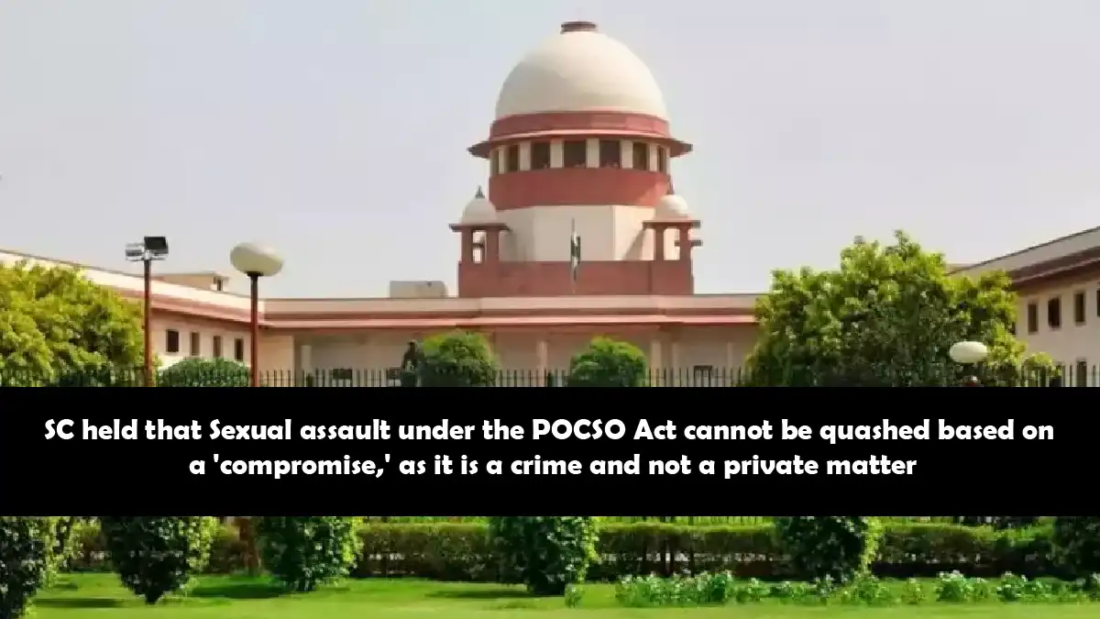Facts of the Case
The case revolves around a teacher accused of sexual assault on a minor girl in a school. The incident occurred when the teacher allegedly rubbed the victim’s breasts in the classroom, with no one else present. When the victim attempted to report the incident to other teachers, she was reportedly threatened by the accused to remain silent. An FIR was subsequently filed, invoking sections of the Indian Penal Code (IPC), the POCSO Act (Protection of Children from Sexual Offences Act), and the SC/ST Act, due to the victim belonging to a scheduled caste.
Table of Contents
However, the parties, including the teacher and the victim’s family, reached a private compromise. Based on this compromise, the Rajasthan High Court quashed the FIR and all further proceedings against the teacher. This decision prompted the appellant, a third-party village resident, to approach the Supreme Court, challenging the High Court’s ruling on the grounds that sexual assault, particularly involving minors, cannot be treated as a private matter.
Contentions of the Parties
The appellant (third party) argued that the Rajasthan High Court erred in quashing the FIR based on a compromise between the parties. The appellant contended that sexual assault, particularly under the POCSO Act, is a heinous crime that affects society at large and cannot be resolved through a private settlement between the victim and the accused.
The respondent (teacher) and the victim’s family, on the other hand, relied on the compromise to argue that the case should be closed, asserting that no further legal action was needed as the dispute was resolved privately.
Court’s Observations
The Supreme Court critically examined the High Court’s decision and found it to be flawed. It noted, “We are at a loss to understand how the High Court arrived at the conclusion that in the case on hand a dispute to be resolved exists between the parties and further that to maintain harmony the FIR and all further proceedings thereto should be quashed.”
The Court emphasized the gravity of sexual assault cases, particularly when minors are involved, asserting that such crimes cannot be treated as private disputes. The Court observed: “When an incident of the aforesaid nature and gravity allegedly occurred in a higher secondary school, that too from a teacher, it cannot be simply described as an offence which is purely private in nature and have no serious impact on the society.”
The Court further clarified the position regarding cases under the POCSO Act, quoting: “Obviously, rubbing the breast of a child would constitute an offence of ‘sexual assault’ under Section 7 of POCSO Act, punishable with imprisonment of either description for a term which shall not be less than three years and may extend to five years and also fine. They would reveal that the commission of such offences against the children should be viewed as heinous and serious. Needless to say, that commission of such offences cannot be taken lightly as offences of private nature and in fact, such offences are bound to be taken as offences against the society.”
The Court referred to previous judgments, including the case of State of M.P. v. Laxmi Narayan (2019) and Sunil Raikwar v. State and Another, which upheld that offences under the POCSO Act are not eligible for compromise.
The Court also disagreed with the High Court’s reliance on Gian Kaur v. State of Punjab (2012), where it held that a compromise could be entertained for private disputes. The Supreme Court highlighted that such a decision was not applicable in cases of sexual assault, particularly where the offense involves a minor.
Court’s Decision
The Supreme Court set aside the Rajasthan High Court’s decision and restored the FIR, directing that criminal proceedings against the teacher continue. The Court emphasized that the nature of the offense, especially one under the POCSO Act, impacts society and cannot be dismissed based on a private compromise. The Court stated, “In view of the very object and purpose of enacting the POCSO Act, we find no reason to disagree with the conclusions in paragraph 12 (of the Delhi HC judgment) extracted above in the given case,” reinforcing that such cases must proceed in the interest of justice and public welfare.
The Court also rejected the argument that the third party (appellant) lacked standing to challenge the quashing of the FIR, stating, “In view of the nature of the offences alleged against the third respondent, one can only say that if they are proved they could be treated only as offences against the society and at any rate, it cannot be said that prosecuting an offender against whom such allegations are made is not in the interest of the society. In fact, it would only be in the interest of the society.”
 Cart is empty
Cart is empty 

